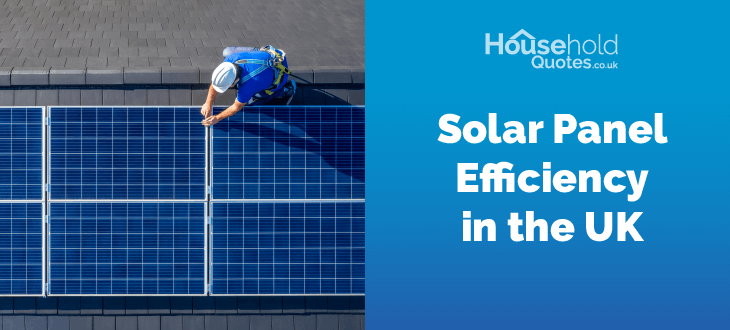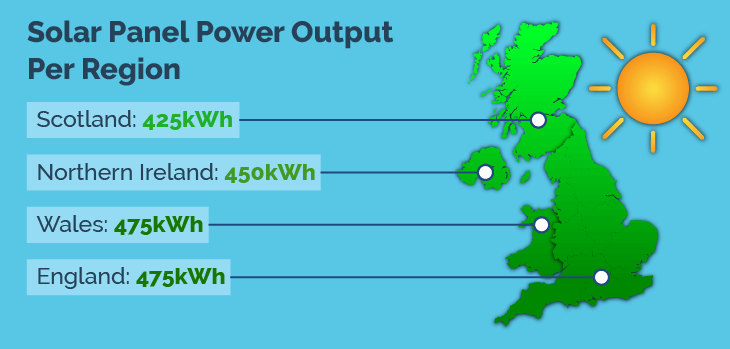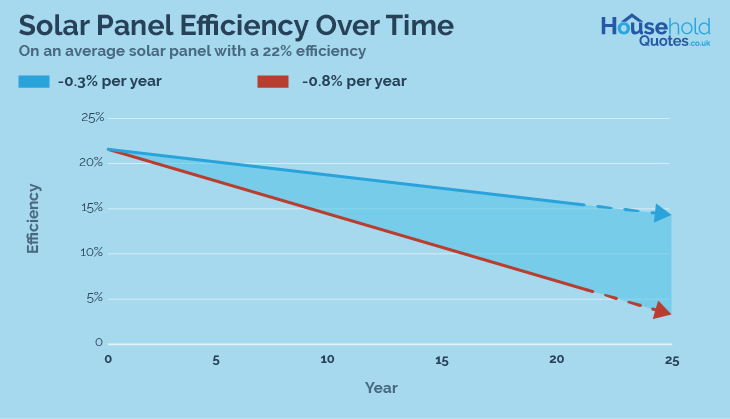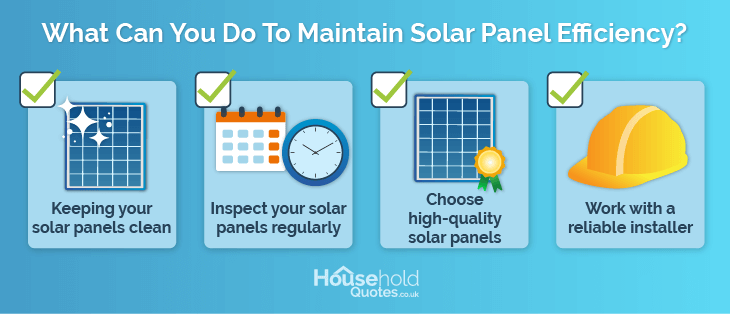Answer these simple questions and we will find you the BEST prices
Which type of solar quotes do you need?
It only takes 30 seconds
100% free with no obligation

Get up to 4 quotes by filling in only 1 quick form

Install a heat pump for less with the BUS grant

Increase the value of your home by installing a heat pump
- Householdquotes.co.uk
- Solar Panels
- Efficiency
Solar Panel Efficiency in the UK: Per Location & Over Time


- Solar panel efficiency in the UK is around 15% to 22% for monocrystalline panels. These levels are the same as those of other locations worldwide.
- Solar panel efficiency decreases over time, with an average of around 0.5% of efficiency lost annually after installation.
- What you can do to maintain solar panel efficiency is keep your solar panels clean, inspect them regularly, and make sure that you choose high-quality solar panels.
When you are asking yourself: “Should I get solar panels?” one of the main things you’ll need to consider is solar panel efficiency. This aspect reveals how well solar panels can convert sunlight into usable electricity for your home and is the key to determining whether a solar system is worth it for you.
In this article, we’ll explain what solar panel efficiency means, why it’s important, and what you can do to maintain or potentially increase efficiency levels. If after reading our guide you’re still unsure about what this all means for you, you should consult a specialist who can offer tailored advice.
Fortunately, with our service, finding a reliable professional and comparing quotes couldn’t be easier. Just fill in our short form, and we’ll put you in touch with up to 4 local solar panel installers. Spare yourself the hassle of endless googling and just click below to get started - it’s quick, simple, and completely free!
- Quotes from local installers
- Payment by finance available
- Save up to £915 per year
It only takes 30 seconds

What is solar panel efficiency?
Solar panel efficiency indicates how well solar panels absorb sunlight and convert it into electricity for your home. It’s measured as a percentage, which in the UK ranges from 10 to 22%.
This range may seem really low, but it’s important to note that while solar panels aren’t 100% efficient, the amount of electricity they can generate at these efficiency levels can adequately power homes of different sizes.
How efficient domestic solar panels are depends on their type. Below you can find an overview of the efficiency ratings for different residential solar panel types:
| Solar Panel Type | Efficiency Rating |
|---|---|
| Monocrystalline | 15 – 22% |
| Polycrystalline | 15 – 20% |
| Thin film | 10 – 20% |
How efficient are solar panels in the UK?
In the UK, solar panel efficiency ranges from 10 to 22%, depending on whether you have monocrystalline, polycrystalline, or thin film solar panels.
These efficiency ratings are very similar to those in the rest of the world. This is because solar panel manufacturers follow similar standards regarding efficiency when producing and supplying solar technologies on the global market.
That said, while there aren’t noticeable differences in efficiency levels across the world or the UK, your location can have an impact on the estimated power output of your solar system. This is due to the varying levels of sunlight exposure your solar panels can have per area. You can find an indication of solar panel output in the UK below:
| Location | Efficiency Levels | Estimated Peak Energy Output (Summer Months) |
|---|---|---|
| London | 10 - 22% | 475kWh |
| Edinburgh | 10 - 22% | 425kWh |
| Cardiff | 10 - 22% | 475kWh |
| Belfast | 10 - 22% | 450kWh |

Is the UK sunny enough for solar panels?
Yes, there are enough sunlight hours in the UK to make installing solar panels worth it. However, it’s important to note that due to the seasonal variations in the country, your solar panels will produce more electricity in the summer than in the winter. These different weather conditions can also have an impact on the overall efficiency of your system.
The surest way to ensure the optimal performance of your solar system is to install it facing the best direction for solar panels, namely southward, and at an angle between between 30 and 50 degrees.
The only way to guarantee that your solar panels are properly installed is by working with a trusted installer. However, finding one on your own can be overwhelming. Thankfully, we’re here to help. We can connect you with up to 4 local solar panel installers vetted by us in no time. Just click below to get started!
- Quotes from local installers
- Payment by finance available
- Save up to £915 per year
It only takes 30 seconds

How does solar panel efficiency decrease over time?

Are you wondering what solar panel efficiency over time looks like? Well, the answer is that the efficiency of solar panels decreases over their lifetime. While they’re expected to operate efficiently for about 25 years, solar experts estimate that solar panel performance degrades by about 0.3 - 0.8% annually.
Whether your solar system will lose more or less efficiency over time depends primarily on the type of solar panels you choose, their make and model, and how well they are installed and cared for. There are several types of solar panel performance degradation, depending on the factors that cause efficiency loss. These include:
- Age-related degradation: Over time, the exposure of your solar panels to various weather conditions leads to the natural wear and tear of your system. Wind, rain, and really high or low temperatures all have an impact on your solar panels, as they can lead to frame deterioration and affect the solar cells, having a detrimental effect on energy production.
- Light-induced degradation (LID): LID occurs when your solar panels are first exposed to UV rays. This is when the highest efficiency loss occurs, as it can reach degradation levels between 1 and 3%. Fortunately, the degradation process slows down after the first year of operation (with only about 0.3 - 0.8% annual efficiency loss).
- Potential-induced degradation (PID): This form of degradation happens at high temperatures and when solar panels are exposed to high voltage. This affects solar panel efficiency, as the power output can decrease by up to 30%.
- Thermal cycling: During temperature changes, solar panels contract and expand depending on whether temperatures increase or decrease. This process is known as thermal cycling and it can lead to small cracks in the solar panels, which impacts how well they can generate energy.
- Humidity freeze: Solar panel efficiency also declines when they’re exposed to high humidity levels and then quickly cool down when a drop in temperatures occurs. This leads to fissures in the solar panels, which, in turn, affects how well they can absorb and convert sunlight into usable electricity.
It’s also important to note that the levels at which solar panel efficiency decreases in time vary significantly depending on the quality of your solar panels. Below, you can find an overview of the degradation rates of some of the best solar panels in the UK in 2025:
| Solar Panel Model | Efficiency Levels | Annual Degradation Levels |
|---|---|---|
| REC Alpha Pure-R | 22.3% | 0.35% |
| SunPower Maxeon 6 | 22% | 0.2% |
| Sunpower Maxeon 3 | 21.2% | 0.2% |
How can you increase PV panel efficiency?

While solar panel degradation over time is inevitable, there are a few things you can do to maintain the efficiency of your solar system. These include:
- Keeping your solar panels clean: Make sure that the surface of your solar panels is free of any debris. This way, they can operate efficiently, as they can properly absorb sunlight and convert it into usable electricity for your home.
- Inspecting your solar panels regularly: Keeping an eye on your solar system and having it periodically checked by a professional can significantly impact long-term solar panel efficiency. This way, you can spot any damage early on and carry out any necessary maintenance to maintain the optimal performance of your solar panels.
- Choosing high-quality solar panels: The make and model of your solar panels play a huge role in how efficiently they operate. Choosing durable solar panels from reliable manufacturers ensures that you’re investing in technologies with low degradation rates so that you can enjoy them for years to come.
- Working with a reliable installer: The way your solar panels are installed significantly affects how efficiently they can power your home. So, make sure to choose a highly qualified installer you trust to deliver a professional installation tailored to your energy needs.
How can you get efficient solar panels?
Now that you know more about the efficiency of solar panels, you might be ready to look for the most efficient solar panels UK for your home. Wherever you’re located - whether you’re looking for solar panels in Wales or solar panels in Scotland, to name but a few options - the surest way to get the most efficient system is to consult a solar expert.
Not only can they offer you advice about the most efficient solar panels on the market, but they can also help you answer questions such as: “How many solar panels do I need for my home?” or “How much do solar panels cost?” By working with a reliable professional, you can make sure that you get the best solar system for your energy needs.
However, finding a specialist on your own can take hours if not days of your precious free time. Instead of doing this tedious research on your own, let us help you get started in just 30 seconds. Just fill in our form and we’ll have 4 reputable solar panel installers from our network reach out to you with free, non-binding quotes. Click below to get started now!
- Quotes from local installers
- Payment by finance available
- Save up to £915 per year
It only takes 30 seconds

Frequently asked questions
In the UK, solar panels have efficiency levels ranging from 10 to 22%. However, it’s important to know that their efficiency can be lower or higher depending on the type of solar panels you choose.
Yes, solar panel efficiency only reaches up to 22%. That said, this level is enough to power a home if you choose the right solar panels for your energy needs.
If you’ve had your solar panels for 10 years, they should still be highly efficient, unless any factors have contributed to a faster solar panel degradation process.
In the UK, solar panel efficiency ranges from 10 to 22%, depending on the type of solar panels you choose. To be sure that you find highly efficient solar panels for your home, you’ll need to consult a professional who can offer you tailored advice.

Sabria is a writer committed to making even the most complex information about sustainability and energy efficiency easily accessible to homeowners looking to make greener choices. With a background in literary studies, she has a wealth of experience when it comes to academic research and writing.
